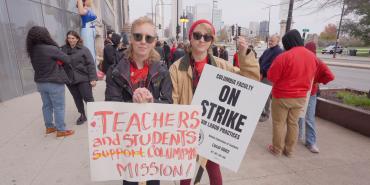Adjunct faculty at Columbia College in Chicago are standing strong, entering week three of a strike that is holding administrators accountable for undervaluing faculty and harming students.
At the center of the strike is the cancellation of more than 300 course sections, causing students to go without the classes they need to graduate and part-time faculty to go without the per-class income they need to make ends meet. Administrators canceled the classes without consulting faculty, and the Columbia College Faculty Union has filed an unfair labor practice in response.
At the same time, remaining classes are increasing in size, sometimes quadrupling—and students say they are reconsidering their enrollment at a school that promised small class sizes with highly accomplished, professionally active faculty. Tim McCain, a theater instructor, had a class with “maybe 20 students in it, then all of a sudden it ballooned up to 85,” he says. “Faculty-student interaction is key, and they’ve lost all of that,” says Reginald Wilson, a design instructor.
Adjunct faculty at Columbia are among the most vulnerable in academia, but they are not the only ones. Across the nation, as the AFT reports in its recently released “An Army of Temps: AFT Contingent Faculty Quality of Life/Work Report,” job security, low pay and lack of respect plague a profession where the majority of classes are taught by adjuncts and contingent faculty.
At Columbia, adjunct contracts go from semester to semester; some adjuncts don’t know whether they’ll have any work just days before the semester begins. They are often assigned only two classes per semester, which amounts to about $30,600 a year. Because of this instability, adjuncts often teach at other campuses as well, cobbling together a schedule that has them zipping around the greater Chicago area and still making so little that many of them qualify for government benefits like Supplemental Nutrition Assistance Program benefits.
“The majority of faculty at Columbia College are living paycheck to paycheck,” says CFAC President Diana Vallera. “You’re counting your grocery money, you’re deciding whether you’re going to be able to make rent that month, you’re deciding whether you’re going to hit your utility bills,” says Elizabeth Swanson, a theater instructor who is on Medicaid.
That is quite a contrast to Columbia President Kwang-Wu Kim, who earns more than $1 million a year and received a $250,000 bonus, even as classes were cut for what the college said were budgetary reasons. “Just the bonus alone would have saved 49 courses,” says Vallera.
The disparity is glaring, and union members are worried that the college’s priorities align more closely with a for-profit model than with the liberal arts, personalized model that has characterized this small, private art school in the past. Founded in 1890, the college now serves many Chicago Public School graduates—30 percent of its student body—and its tuition, at just over $30,000, is about $10,000 lower than the average national cost for a year of college.
Nevertheless, students are upset that their tuition dollars no longer ensure the broad selection of classes they expected when they enrolled, professors who are well-compensated and therefore not distracted by trying to make ends meet, and class sizes that allow them to have meaningful relationships with faculty and other students.
“What Dr. Kim is doing is a moral outrage,” said AFT President Randi Weingarten, who joined the picket lines Nov. 3. “He’s cutting the heart out of this college for our kids.” Not only that, she told faculty, “he’s putting you on the streets and threatening your jobs every single day.”
“We should be focusing on students,” said Weingarten. “We should have more course offerings, not less. And we should be treating the people who are the backbone of [this college] with dignity and respect.”
To read an earlier story about the strike, click here.
[Virginia Myers]


